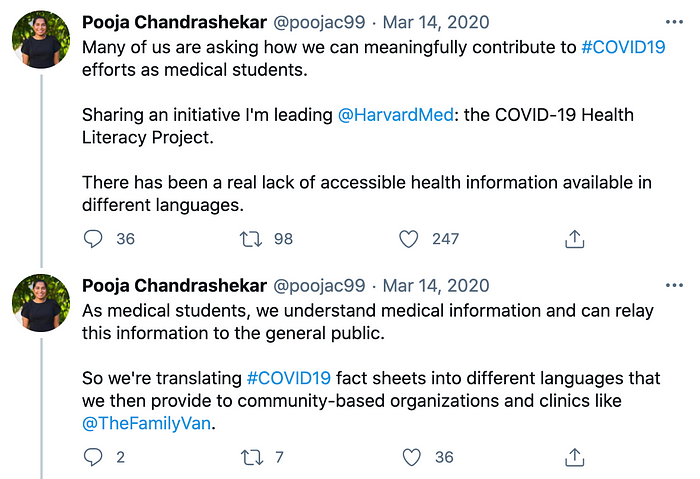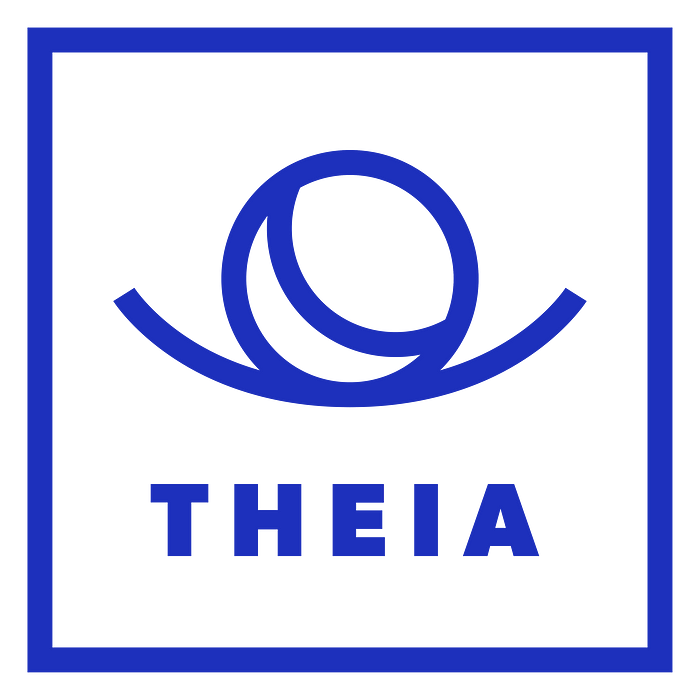Breaking the language barrier: Pooja Chandrashekar of COVID-19 Health Literacy Project

Pooja Chandrashekar is a second-year medical student at Harvard Medical School and is the founder of the COVID-19 Health Literacy Project, which aims to create and translate accessible COVID-19 information into different languages to help all patients know when, and how, to seek care. Pooja founded ProjectCSGIRLS as a high school sophomore to encourage young women in STEM. Pooja graduated from Harvard College with an A.B. in Biomedical Engineering and subsequently completed a Fulbright Scholarship in India. Alongside clinical medicine, she is passionate about improving the quality and delivery of healthcare, and hopes to leverage emerging technologies and policy levers to transform care for underserved populations. She is additionally passionate about education equity and advocate for increased access to STEM education, especially among low-income and minority students.
In our conversation with Pooja, we got insight into her work with the COVID-19 Health Literacy Project, which was born out of language barriers being a major factor in health disparities in the pandemic. A group of over 175 medical students who spoke 40+ languages came together to research, translate, and put aggregate fact sheets about COVID-19 that could then be distributed to community centers and organizations. The priority for these fact sheets were that they be culturally appropriate, accurate and evidence-based, and accessible to people with different levels of scientific knowledge.

Highlights of our conversation with Pooja include:
- Mobilizing health students early: In today’s social media age, Pooja recognized that a great way to access a network of people passionate about healthcare would be Twitter. Early in the pandemic, she sent out a call-to-action on Twitter for healthcare students (nursing, PA, medical) who spoke languages other than English. Shortly after this initial Twitter blast, Pooja operationalized this interest into a form, through which she found 175 students who would become the core team of the Project. In addition to these students, faculty support was critical to ensuring they were disseminating the highest-quality, most accurate information they could. Faculty in language and science helped vet the information, revising based on cultural appropriateness and timeliness. Establishing credibility in this process was vital, and Pooja and her team worked with Harvard Health Publishing to ensure that the material was recognizable as coming from a reputable source.
“It actually started with a millennial approach. It started with a call to action on Twitter… I received over 300 responses from medical students around the world who were eager to contribute their time and energy to the cause.”
- Disseminating the facts: Strategic partnerships were a key conduit in outreach to community members. While building these partnerships, there were critical questions Pooja and her team needed to ask: “how can we make our materials useful to you?” and “how can we make sure we’re making these materials for your communities?” Pooja had in part recognized the community need for COVID-19 information in all languages through her work with The Family Van, a community mobile health organization led by Boston-based community members trying to reduce health disparities by bringing care to people where they need it. When addressing language barriers, different communities have different needs, so the Project had to work with organizations running the gamut: hospital, health systems, cities, public health departments, advocacy groups, community-based organizations. Once Pooja could show these community leaders and organizations that their materials were credible and useful to the communities, these organizations became vital to disseminating the materials as well as getting feedback for further iterations. A major issue in sharing these materials was concern about public misinformation around the pandemic and the vaccine. Pooja and her team are working on similar fact sheets in myriad languages to help diminish some of the mistrust in the COVID-19 vaccine.
“When they bought into the materials, their communities bought in.”
“You can never cross the ocean unless you have the courage to lose sight of the shore.” — Christopher Columbus, quoted by Pooja

Want to hear our conversation with Pooja? Check out our podcast Spotlight on Women in Health Ventures on Spotify and Anchor!
Theia is a 501(c)(3) non-profit dedicated to inspiring and empowering the next generation of women entrepreneurs and investors in healthcare. Visit our website to join our community and access resources that will support your entrepreneurial journey and pursuit of changing healthcare.
Story written by Luiza Perez and Priya Kumar.
